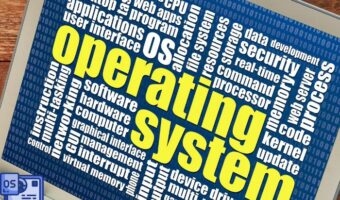About This Course
The “Advanced Operating System Concepts” course is designed to provide a deep exploration into the intricate and cutting-edge aspects of modern operating systems. Building upon the foundational knowledge gained from previous courses, this advanced-level offering delves into sophisticated concepts that drive the evolution of operating systems in the digital age. Students will navigate through complex topics, critically analyze advanced mechanisms, and gain insights into the challenges and innovations that shape contemporary computing environments.
Through a blend of comprehensive lectures, research-driven discussions, and hands-on experiments, this course equips students with an in-depth understanding of the following advanced operating system concepts:
Distributed Systems: Explore the principles and challenges of designing, implementing, and managing distributed operating systems, enabling seamless communication and resource sharing across networked devices.
Concurrency and Parallelism: Delve into advanced techniques for managing multiple tasks concurrently and harnessing parallel processing to enhance system performance.
Virtualization and Cloud Computing: Examine the virtualization of hardware resources and delve into the complexities of cloud computing infrastructures, including provisioning, orchestration, and scalability.
Advanced Memory Management: Dive into advanced memory management strategies, including memory hierarchies, NUMA architectures, and memory optimization techniques.
Advanced File Systems: Analyze advanced file system designs, such as journaling, distributed file systems, and techniques for ensuring data integrity and recovery.
Real-Time Operating Systems: Gain insights into real-time operating systems that cater to stringent timing requirements for mission-critical applications.
Security and Privacy: Explore advanced security mechanisms, encryption techniques, access control models, and strategies to mitigate security threats.
High Availability and Fault Tolerance: Study techniques for achieving high availability and fault tolerance in operating systems, ensuring system reliability and resilience.
Emerging Trends: Stay up-to-date with the latest trends in operating systems, such as containerization, microservices, edge computing, and the impact of IoT.
Throughout the course, students will engage in practical labs, simulation exercises, and research projects that challenge them to apply theoretical knowledge to real-world scenarios. By the end of the course, participants will be well-versed in the advanced intricacies of operating systems, prepared to tackle the complexities of modern computing environments, and poised to contribute to the ongoing innovations in the field.
Prerequisites: Successful completion of foundational operating system courses or equivalent knowledge.
Assessment: The course will be assessed through assignments, research projects, group discussions, and a comprehensive final assessment that reflects a holistic understanding of advanced operating system concepts.
Join us in the “Advanced Operating System Concepts” course to deepen your expertise and navigate the forefront of operating system advancements in today’s dynamic digital landscape.
Learning Objectives
Material Includes
- E-Books
- Informative Materials
- Interview Preparation
- Certificate of completion
This course is best for:
- Experienced Computer Science Students: Undergraduate or postgraduate students with a strong foundation in operating systems and computer science who seek a deeper understanding of the intricate and cutting-edge aspects of modern operating systems.
- Aspiring Systems Architects: Individuals aiming to become systems architects, software engineers, or researchers who wish to delve into advanced operating system concepts to design and develop high-performance and innovative computing environments.
- Seasoned IT Professionals: IT professionals, system administrators, and network engineers with prior knowledge of operating systems who are keen to explore advanced concepts to optimize and manage complex computing infrastructures.
- Embedded Systems Engineers: Engineers working on embedded systems, real-time applications, or IoT devices who need to master real-time operating systems, concurrency, and memory management for critical applications.
- Cloud and Virtualization Specialists: Professionals working with cloud computing platforms or virtualization technologies who want to understand the advanced intricacies of resource management and scalability.
- Cybersecurity Experts: Security professionals aiming to enhance their knowledge of security mechanisms within operating systems to better safeguard data and mitigate threats.
- Academics and Researchers: Professors, researchers, and scholars in computer science and related fields seeking to expand their expertise in advanced operating system topics for teaching and research purposes.
- Computer Science Enthusiasts: Enthusiasts passionate about delving into the forefront of operating system advancements to gain insights into the latest trends and innovations.
- This course is ideal for those who have a strong grasp of foundational operating system concepts and are eager to explore the sophisticated aspects of modern operating systems that shape the landscape of contemporary computing.
Curriculum
Distributed Systems and Networked Operating Environments
Introduction to Distributed Systems and Networked Operating Environments
Characteristics and Benefits of Distributed Computing
Types of Distributed Systems: Client-Server, Peer-to-Peer, Cloud
Communication Models and Protocols in Distributed Systems
Assignments
Concurrency, Parallelism, and Multithreading
Introduction to Concurrency, Parallelism, and Multithreading
Understanding Concurrency and Parallelism Concepts
Benefits and Challenges of Multithreaded Programming
Thread Creation and Management in Multithreaded Applications
Assignments
Virtualization and Cloud Computing Infrastructures
Understanding Virtualization: Types and Benefits
Hypervisors and Virtual Machine Management
Containerization: Docker, Kubernetes, and Orchestration
Assignments
Advanced Memory Management Techniques
Introduction to Advanced Memory Management Techniques
Overview of Memory Hierarchy and Importance of Memory Management
Memory Allocation Strategies: Contiguous vs. Non-contiguous
Paging and Segmentation: Virtual Memory Concepts
Assignments
Advanced File System Designs and Strategies
Introduction to Advanced File System Designs and Strategies
Evolution of File Systems: From FAT to Modern Designs
Characteristics and Requirements of Advanced File Systems
Journaling and Transactional File Systems
Assignments
Course Provided By

Material Includes
- E-Books
- Informative Materials
- Interview Preparation
- Certificate of completion
Explore More Courses
Related Courses





